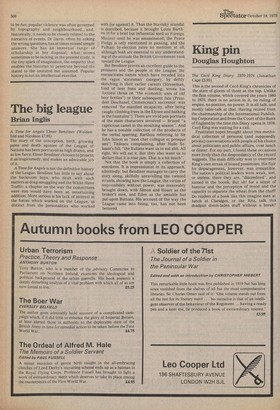The big league
Brian Inglis
A Time for Angels Elmer Bendiner (Weidenfeld and Nicolson £7.95) The story of the conception, birth, growing pains and death agonies of the League of Nations has been portrayed as high drama, and as low farce; Elmer Bendiner chooses to present it as tragicomedy, and makes an admirable job of it.
A Time for Angels is not the definitive history of the League. Bendiner has little to say about the backroom boys, who dealt with such matters as drug-smuggling and the White Slave Traffic: a chapter on the way the committees were run would have been an entertaining addition. More serious is his lack of interest in the forces which worked on the League, as distinct from the personalities who worked
with (or against) it. Thus the Stavisky scandal is described, because it brought Louis Barthou in for a brief but influential spell as Foreign Minister until he was assassinated; the Peace Pledge is only mentioned in passing, and the Fulham by-election rates no mention at all, although both are essential to any understanding of the attitude the British Government took toward the League.
But Bendiner proves an excellent guide to the pressures and the people in the League. He rescuscitates names which have receded into the vague 'statesman' category, by deftly sketching in their earlier careers (Streseman, fond of beer fests and duelling, wrote his Joctoral thesis on "the economic uses of old beer bottles") or their subsequent fate (President Desehanel, Clemenceau's successor, was removed "for manifest incapacity, after being caught climbing trees in the Elysee and bathing in the fountains"). There are vivid pen portraits of the main characters involved — Briand "a capricious camel in the moulting season". And he has a notable collection of the products of the verbal sparring; Barthou referring to Sir John Simon as "mon cher collegue et presque ami"; Titilescu complaining, after Haile Se lassie's fall, "the Italians want us to eat shit. All right. We will eat it. But they also want us to declare that it is rose jam. That is a bit much".
Not that the book is simply a collection of anecdotes. It is impressionist in its approach, admittedly, but Bendiner manages to carry the story along, skilfully unravelling the twisted strands, showing how the League, the victim of responsibility without power, was inexorably brought down, with Simon and Hoare as the broker's men, and Eden as the amiable but put-upon Buttons. His account of the way the League came into being, too, has not been bettered.


































 Previous page
Previous page